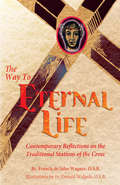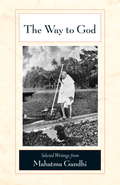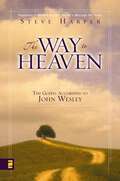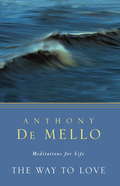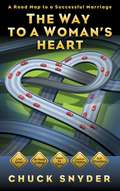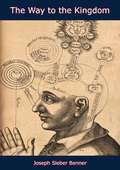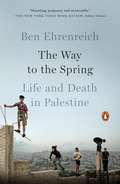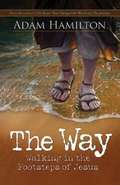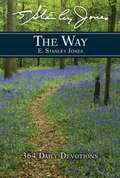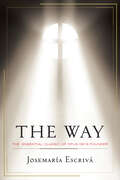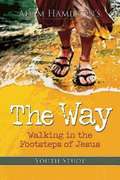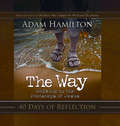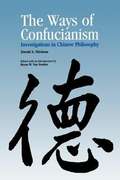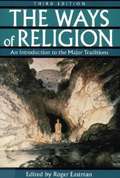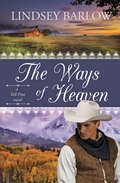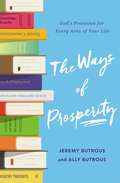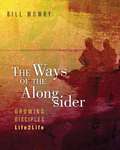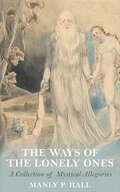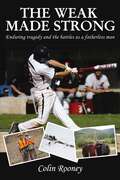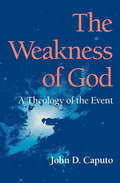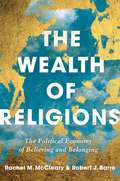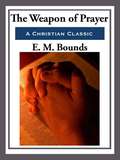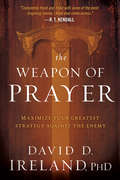- Table View
- List View
The Way to Eternal Life
by Brother Francis Wagner Father Donald WalpoleThe way to Eternal Life is through the Cross, and to be effective, it requires our cooperation--the loving gift of self in response to God's love for us. God's desire to involve us in his merciful act of redemption. This book is intended to be an extended meditation on that mystery. It is not a devotional guide on the Stations of the Cross in the traditional sense--though it can certainly be used as such. Rather, each Station offers avenues of reflection connecting the Cross of Christ with our own.
The Way to God
by Mahatma Gandhi Michael N. Nagler Arun Gandhi M. S. DeshpandeMahatma Gandhi became famous as the leader of the Indian independence movement, but he called himself "a man of God disguised as a politician." The Way to God demonstrates his enduring significance as a spiritual leader whose ideas offer insight and solace to seekers of every practice and persuasion. Collecting many of his most significant writings, the book explores the deep religious roots of Gandhi's worldly accomplishments and reveals--in his own words--his intellectual, moral, and spiritual approaches to the divine. First published in India in 1971, the book is based on Gandhi's lifetime experiments with truth and reveals the heart of his teachings. Gandhi's aphoristic power, his ability to sum up complex ideas in a few authoritative strokes, shines through these pages. Individual chapters cover such topics as moral discipline, spiritual practice, spiritual experience, and much more. Gandhi's guiding principles of selflessness, humility, service, active yet nonviolent resistance, and vegetarianism make his writings as timely today as when these writings first appeared. A foreword by Gandhi's grandson Arun and an introduction by Michael Nagler add useful context.
The Way to Heaven: The Gospel According to John Wesley
by Steve HarperIs There a Way to Heaven? The great evangelist John Wesley believed there is, and he developed his theology to help people make the journey from sin to salvation. In Wesley’s “order of salvation,” God’s grace is the keynote from start to finish. The Way to Heaven is a twentieth-anniversary revision of John Wesley’s Message for Today. Dr. Steve Harper presents Wesley’s writings and the ideas of Wesley scholars in language that is clear and accessible but never simplistic. Written in the spirit of Wesley, here are “plain words for plain people.” The heart of this book is a thoughtful and inspiring look at Wesley’s theology of grace and its power to transform. Included are two new chapters. “Vision and Means” explores Wesley’s mission and methods, and “To Serve the Present Age” considers the impact and relevance of his message today. In addition, an updated reading list facilitates further study, and questions at the end of each chapter stimulate personal reflection and small group discussion. Ideal as a textbook or for personal study and reflection, this book will advance your knowledge and piety as you travel “the way to heaven.”
The Way to Life: At the Heart of the Tao Te Ching
by Benjamin HoffAround 2,500 years ago, a man appeared at Han-ku Pass in northwest China, traveling toward the wilderness beyond the border. The Keeper of the Pass recognized the man known as Lao-tze, Old Master, and realized from his words that he did not intend to return. He begged Lao-tze to leave some of his guiding principles. After many refusals, Lao-tze gave in and wrote what he considered to be useful on some bamboo tablets. He presented these and resumed his journey, vanishing from sight. The statements he left behind have come to be known as the Tao Te Ching (Tao Virtue Classic), the book of Tao and its characteristics. Tao can roughly be described as the ways or laws of the life force found within all things at all times as well as the inner power itself, inseparable from its external actions. Literally, Tao means road, path, or way; following Tao can mean working with universal energy and its natural laws.
The Way to Love: Meditations for Life
by Anthony De MelloProfound love is at the heart of this warm, compassionate collection of meditations by spiritual master Anthony de Mello -- a last inspiring gift to the countless readers whose lives he touched.
The Way to a Woman's Heart: A Road Map to a Successful Marriage
by Chuck SnyderFollowing on the heels of Men: Some Assembly Required, his instruction manual on men written for women, popular author and speaker Chuck Snyder comes full circle with a much-needed book that explains the mysteries of women to men. Speaking in a man's language, from an unashamedly male viewpoint, Snyder cleverly interweaves humor and insight to teach what wives need ... and what it means for husbands to "die" for their wives on an everyday basis. Acknowledging that men want to meet women's needs but often don't know how, Snyder effectively teaches husbands how to love their wives in ways that will make them truly feel loved.
The Way to the Kingdom
by Joseph Sieber Benner“THESE words are addressed to those who are seeking the way into the Kingdom of God—the Kingdom where a Great Love and Wisdom, the serving and the inspiring of others, and the utter forgetfulness of self, are the natural life of everyone who dwells therein...”Joseph Sieber Benner (January 3, 1872 – September 24, 1938) was an American author, New Thought writer and Representative of the Brotherhood of Christ who used the pen name "Anonymous". He was the first to introduce the Knowledge and Teachings of Impersonal Life (also known as the "I AM" Teaching) to the world in his first book, The Impersonal Life published in 1914. His other works were The Way Out, The Way Beyond, Wealth, Teacher, Brotherhood, The Way to the Kingdom, Papers (65 Lessons), etc.
The Way to the Spring: Life and Death in Palestine
by Ben EhrenreichFrom an award-winning journalist, a brave and necessary immersion into the everyday struggles of Palestinian life Over the past three years, American writer Ben Ehrenreich has been traveling to and living in the West Bank, staying with Palestinian families in its largest cities and its smallest villages. Along the way he has written major stories for American outlets, including a remarkable New York Times Magazine cover story. Now comes the powerful new work that has always been his ultimate goal, The Way to the Spring. We are familiar with brave journalists who travel to bleak or war-torn places on a mission to listen and understand, to gather the stories of people suffering from extremes of oppression and want: Katherine Boo, Ryszard Kapuściński, Ted Conover, and Philip Gourevitch among them. Palestine is, by any measure, whatever one's politics, one such place. Ruled by the Israeli military, set upon and harassed constantly by Israeli settlers who admit unapologetically to wanting to drive them from the land, forced to negotiate an ever more elaborate and more suffocating series of fences, checkpoints, and barriers that have sundered home from field, home from home, this is a population whose living conditions are unique, and indeed hard to imagine. In a great act of bravery, empathy and understanding, Ben Ehrenreich, by placing us in the footsteps of ordinary Palestinians and telling their story with surpassing literary power and grace, makes it impossible for us to turn away.
The Way, Expanded Paperback Edition: Walking in the Footsteps of Jesus (The Way)
by Adam HamiltonTravel with Adam Hamilton as he retraces the life and ministry of Jesus Christ. Once again, Hamilton approaches his subject matter with thoughtfulness and wisdom, just as he did with Jesus’ crucifixion in 24 Hours That Changed the World and with Jesus’ birth in The Journey. Read The Way on your own or, for a more in-depth study, enjoy it with a small group or part of a 40-day church-wide emphasis during Lent and Easter or anytime of the year.Using historical information, archaeological data, and stories of the faith, Hamilton follows in the footsteps of Jesus from his baptism to the temptations to the heart of his ministry, including the people he loved, the parables he taught, the enemies he made, and the healing he brought. This 40-day focus will help you and your group grow deeper in their faith, learn more about the life of Christ, spend time daily reading and reflecting upon the Scriptures, and invite families, through the children’s and youth studies, to grow together in their faith. Additional resources include a DVD, devotional, youth and children editions, and a worship download to help with sermon planning.Lent, Lenten, Lenten Resource, Lenten Resources, Lent Study, Lent Studies, Easter, Easter Study, Easter Studies
The Way: 364 Daily Devotions
by E. Stanley JonesIf we are to get "a sparkle, a buoyancy . . . back into life, we can get it only as we are sure we are on the Way," says E. Stanley Jones. The Way—God’s Way—is revealed in the life and teachings of Jesus Christ as well as in the structure of reality. This practical volume leads step-by-step through the implications of the Way in every aspect of life. It progresses through 52 topics with daily readings, Scripture references, and prayer. A sequel to Victorious Living and Abundant Living, The Way offers a positive solution for mental and spiritual confusion, and guidance for a life filled with meaning.
The Way: The Essential Classic of Opus Dei's Founder
by Josemaria EscrivaOVER FOUR MILLION COPIES SOLD • A meaningful Lenten resource from Saint Josemaría Escrivá, the founder of Opus Dei, full of timeless reflections that point the way to a life that is infused with faith.The inspiration for Hallow&’s 2025 Lent Pray40 Community Prayer ChallengeThe Christian&’s life in this world is a journey in search of the love of Christ. St. Josemaría&’s book is an open invitation to set out on that journey, and its final stage speaks to us of the love that comes, as a result of seeking and finding Christ, as the fulfillment of that arduous journey, a love that, in fact, was there all along, seeking us out.—Bishop Javier Echevarría, from theintroductionReflecting Saint Josemaría Escrivá&’s conviction that God can be found in the everyday, The Way blends passages from sacred Scripture with anecdotes drawn from Escrivá&’s life and work, snatches of conversation, and selections from his personal letters. These short, poignant meditations, totaling 999 &“points,&” together form a guide to a better life and &“a more worthy soul.&” The Way beautifully conveys Escrivá&’s belief that the human is not foreign to the divine, and that the fully Christian spiritual attitude can be described as unity of life.
The Way: Walking in the Footsteps of Jesus (The Way)
by Adam HamiltonTravel with Adam Hamilton as he retraces the life and ministry of Jesus Christ. Once again, Hamilton approaches his subject matter with thoughtfulness and wisdom, just as he did with Jesus’ crucifixion in 24 Hours That Changed the World and with Jesus’ birth in The Journey. Using historical information, archaeological data, and stories of the faith, Hamilton follows in the footsteps of Jesus from his baptism to the temptations to the heart of his ministry, including the people he loved, the parables he taught, the enemies he made, and the healing he brought.Everything needed to conduct a 7-week study during Lent and Easter for ages 13-18. Use with the adult-level DVD.
The Way: Walking in the Footsteps of Jesus (The Way)
by Adam HamiltonIn this companion volume that functions beautifully on its own or as part of the churchwide experience, Adam Hamilton offers 40 days of daily devotions on the life and ministry of Jesus Christ, enabling us to pause, meditate, and emerge changed forever. The reflections, ideal for use during Lent, include Scripture, reflection, stories from Hamilton’s own ministry, and prayers.
The Ways Of Confucianism: Investigations In Chinese Philosophy
by David S. Nivison Bryan Van Norden<P>The study of Chinese philosophy requires an unusual combination of talents.<P> First, one must be a philosopher at heart (if not of academic department), for the issues that Mencius, Zhuāngzĭ [Chinese text removed], Zhū Xī [Chinese text removed] Wang Yángmíng [Chinese text removed], and other Chinese thinkers address are living philosophic issues. <P>Just as it took someone with a genuine understanding of science--Joseph Needham--to first appreciate Chinese science, so it takes a genuine philosopher to fully engage Chinese philosophy.<P> Second, one must be a Sinologist, for even modern Chinese are separated by wide linguistic and cultural barriers from their predecessors.<P> And to study Chinese philosophy without the tools to overcome those barriers is merely to project one's own preoccupations and concerns onto an alien culture, thereby robbing oneself of the opportunity for a genuine "fusing of horizons." Among the generation of scholars who came to intellectual maturity following the second world war, several stand out for their knowledge of both philosophy and Sinology. Among these are A. C. Graham, D.C. Lau, Donald Munro, and David S. Nivison.<P> Of these four, Nivison's work is the least well known. Although highly respected in Sinological circles and among us "happy few" who study Chinese philosophy, Nivison has remained a philosopher's philosopher, and his work is not commonly cited.<P> Consider two outstanding recent histories of ancient Chinese philosophy--Benjamin Schwartz's The World of Thought in Ancient China (1985) and A. C. Graham's Disputers of the Too (1989). Schwartz cites only two papers by Nivison--one dating the conquest of the Shang by the Zhou (1983), and one a highly technical bit of philology analyzing Shang Dynasty oracle bone inscriptions (1978-1979). Graham, on the other hand, cites three articles by Nivison, only one of which is on philosophy (1980a), the other two essays dealing with chronological issues (1982-1983,1983).
The Ways Of Religion: An Introduction To The Major Traditions
by Roger EastmanRevised and updated, the third edition of this highly acclaimed anthology surveys all the major religious traditions―Hinduism, Buddhism, Confucianism, Taoism, Judaism, Christianity, Islam, and African religions―and also covers Zen Buddhism, Shinto, and the religious experience in America. Ideal for courses in world religions and comparative religion, it introduces the unique claims, hopes, and wisdom of each tradition in its own voice, through substantial excerpts from its scriptures, prophets, and authors. "I have tried to pay heed," Eastman writes in his Preface, "to A. C. Bouquet's warning of many years ago that the study of religion may sink to the level of collecting dead insects or pressed flowers, which in the process lose all their color and reality. There is not much excuse for a dreary book about a subject as inherently interesting and provocative as the world's religions." The following selections are new to the third edition: Diana L. Eck's "Frontiers of Encounter," Barbara Stoler Miller on Yoga, R. K. Narayan's story "Chudala," Julia Ching's "Confucianism in Perspective," Thomas Merton on Chuang Tzu, Joseph M. Kitagawa's "The Way of the Kami," Ian Reader on Shinto, Vincent Mulago on African Religions, and "A Personal Note" by John Hick.
The Ways of Heaven: a Tall Pine novel (Tall Pine #2)
by Lindsey Barlowa heartbroken, a life mended, a love ignitedAfter Cade Walker’s gambling spirals out of control, Rose walks away from her marriage—and straight into motherhood by adopting Daisy, her cousin’s biracial daughter orphaned in a Typhoid outbreak.Heartbroken and overwhelmed with the task ahead of her, Rose returns to her hometown of Tall Pine, Colorado, where she seeks the comfort of friends and family. The one person she doesn’t ever expect to see again is her husband, Cade—but when he comes riding in to town, her world is once again upended.Meanwhile, Rose meets Meg, who lives under the abusive rule of her stepfather as the cook at his hotel. Before she knows it, Rose has convinced Meg to escape to the safety of Tall Pine. Away from the blows and anger of her stepfather, Meg is looking forward to a tranquil life—that is, until she meets the town doctor. Meg immediately recognizes him from the hotel, and though she has long admired him from a distance, she knows she can never be worthy of his love.When cattle thieves, murder, and shadows from their pasts threaten all that Rose and Meg hold dear, they must find the courage to forgive, to heal, and even to love again.
The Ways of Prosperity: God's Provision for Every Area of Your Life
by Jeremy Butrous Ally ButrousGod wants our days to be abundant and thriving! Learn to cultivate habits that produce prosperity and contentment in every area of life.What if you were immersed in a daily experience of prosperity—one that would give you hope and impact all of your life? It is likely you would receive God&’s blessings as never before. True prosperity goes beyond the area of finances. It is so much more than you ever imagined. The Ways of Prosperity will guide you to identify and engage with opportunities for prosperity in seven vital areas of life:RelationalSpiritualEmotional and Physical HealthFinancialProfessionalMindsetSocialThe Ways of Prosperity is a biblically based holistic guide to building a thriving life. Jeremy and Ally&’s powerful collaboration utilizes Jeremy&’s decade-long work with Christian authors and speakers and Ally&’s expertise in the field of psychology (she is scheduled to receive her doctorate in September 2020).Walk out your prosperous journey with teachings, prayers, reflections, and activations. This book will help you partner with the abundant life Jesus has made available for you.
The Ways of the Alongsider: Growing Disciples Life2life
by Bill MowryThe Ways of the Alongsider is more than a Bible study or a program. This Bible-centered guide is a fresh approach to making disciples in "life2life" ways. The Ways of the Alongsider paints a new picture of disciple-making that moves this vital ministry out of the hands of ministry professionals to everyone who wants to participate in the great commission. The ten chapters are packed with Bible studies, creative assignments, and challenging reflection questions. You will learn a new pathway to disciple people in life2life ways. Written by veteran Navigators staff member Bill Mowry, The Ways of the Alongsider can be used with small groups, in a class setting, or in a one-to-one discipling relationship. Leader helps included.
The Ways of the Lonely Ones: A Collection of Mystical Allegories
by Manly Palmer HallIn this classic of mysticism, Manly P. Hall shares a series of short stories written to bring the truths of the world to the reader's heart, rather than merely to their intellect and reason. These eight tales tell the stories of seemingly ordinary people whose mystical experiences change the course of their lives and guide them to deeper truths.
The Weak Made Strong: Enduring tragedy and the battles as a fatherless man
by Colin RooneyAfter enduring tragedy through losing his dad and older brother in a plane crash, Colin’s perfect life was crushed. Through his faith in Jesus he had hope to keep pressing on through the pain. During his junior season of baseball at Pepperdine University, God did some amazing things on the baseball field. From hitting a game-winning walk off homerun while his nephew throughout the first pitch to receiving a Gold Glove Award using his older brother’s glove, these things weren’t coincidences, they were miracles. After Colin’s baseball career he endured many challenges not having his dad around to lead him and help teach him how to be a man. These things he faced were emotional lions that came against him trying to defeat him and keep him from being the man that God created him to be. Through his realness and honesty about his wound and the depression, anxiety, and fear that he has experienced as a fatherless man, Colin hopes to encourage others who are facing similar struggles so that they will see that God wants to use their weaknesses and challenges that they are facing to do great things for His glory.
The Weakness of God: A Theology of the Event (Indiana Series in the Philosophy of Religion)
by John D. CaputoThe author of What Would Jesus Deconstruct? makes &“a bold attempt to reconfigure the terms of debate around the topic of divine omnipotence&” (Choice). Applying an ever more radical hermeneutics—including Husserlian and Heideggerian phenomenology, Derridian deconstruction, and feminism—John D. Caputo breaks down the name of God in this irrepressible book. Instead of looking at God as merely a name, Caputo views it as an event, or what the name conjures or promises in the future. For Caputo, the event exposes God as weak, unstable, and barely functional. While this view of God flies in the face of most religions and philosophies, it also puts up a serious challenge to fundamental tenets of theology and ontology. Along the way, Caputo&’s readings of the New Testament, especially of Paul&’s view of the Kingdom of God, help to support the &“weak force&” theory. This penetrating work cuts to the core of issues and questions—What is the nature of God? What is the nature of being? What is the relationship between God and being? What is the meaning of forgiveness, faith, piety, or transcendence?—that define the terrain of contemporary philosophy of religion. &“Caputo comes out of the closet as a theologian in this work.&” —Catherine Keller, Drew University &“Caputo has a gift for explaining Continental philosophy&’s jargon succinctly and accurately, and despite technical and foreign terms, this book will engage upper-level undergraduates. Includes scriptural and general indexes . . . Highly recommended.&” —Choice
The Wealth of Religions: The Political Economy of Believing and Belonging
by Robert J Barro Rachel McClearyHow religious beliefs and practices can influence the wealth of nationsWhich countries grow faster economically—those with strong beliefs in heaven and hell or those with weak beliefs in them? Does religious participation matter? Why do some countries experience secularization while others are religiously vibrant? In The Wealth of Religions, Rachel McCleary and Robert Barro draw on their long record of pioneering research to examine these and many other aspects of the economics of religion. Places with firm beliefs in heaven and hell measured relative to the time spent in religious activities tend to be more productive and experience faster growth. Going further, there are two directions of causation: religiosity influences economic performance and economic development affects religiosity. Dimensions of economic development—such as urbanization, education, health, and fertility—matter too, interacting differently with religiosity. State regulation and subsidization of religion also play a role.The Wealth of Religions addresses the effects of religious beliefs on character traits such as work ethic, thrift, and honesty; the Protestant Reformation and its long-term effects on education and religious competition; Communism’s suppression of and competition with religion; the effects of Islamic laws and regulations on the functioning of markets and, hence, on the long-term development of Muslim countries; why some countries have state religions; analogies between religious groups and terrorist organizations; the violent origins of the Dalai Lama’s brand of Tibetan Buddhism; and the use by the Catholic Church of saint-making as a way to compete against the rise of Protestant Evangelicals.Timely and incisive, The Wealth of Religions provides fresh insights into the vital interplay between religion, markets, and economic development.
The Weapon of Prayer
by E. M. BoundsIt must never be forgotten that Almighty God rules this world. He is not an absentee God. His band is ever on the throttle of human affairs. He is everywhere present in the concerns of time. "His eyes behold, his eyelids try the children of men." He rules the world just as He rules the Church by prayer. This lesson needs to be emphasized, iterated and reiterated in the ears of men of modern times and brought to bear with cumulative force on the consciences of this generation whose eyes have no vision for the eternal things, whose ears are deaf toward God.
The Weapon of Prayer: Maximize Your Greatest Strategy Against the Enemy
by David IrelandThe Christian walk is a warfare walk. We cannot sit idly by and expect to enter heaven loaded down with God&’s promises. We must fight our dreaded adversaries in a most skillful way. This is how we are going to fulfill the Great Commission, bring deliverance to the captives, build a hedge of protection around our families, and put Satan on the defense. David D. Ireland provides an in-depth, yet easily applicable, teaching to help you become a victorious warrior. You will learn how to adopt a new biblical mind-set; how to put faith in action in career, marriage, parenting, etc.; and how to seize your destiny. Prayer was Jesus&’s secret weapon, and it must be yours too. Just as a soldier goes through boot camp to learn how to skillfully use his weapons, this book will be your spiritual boot camp for mastering your greatest weapon—PRAYER.
